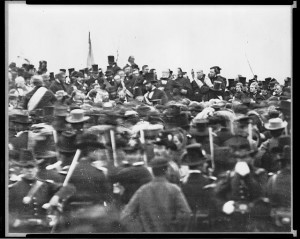Lincoln delivered the Gettysburg address Nov 19, 1863, at the dedication of the National Cemetery created to honor the Union dead of the Battle of Gettysburg. The ceremony took place about four months after the battle; the War still had about a year and a half to go. I’ve read this simple, beautiful oration many times. Yet until I read the NY Times article that was published the next day, I never had a sense of the setting: the other dignitaries who gave speeches, the applause of the crowd, the patriotic colors, the great throng of men and women and children attending.

Although a heavy fog clouded the heavens in the morning during the procession [through the town to the cemetery], the sun broke out in all its brilliancy during the Rev. Mr. STOCKTON’s prayer and shone upon the magnificent spectacle. The assemblage was of great magnitude, and was gathered within a circle of great extent around the stand, which was located on the highest point of ground on which the battle was fought. A long line of military surrounded the position taken by the immense multitude of people.
The Marshal took up a position on the left of the stand. Numerous flags and banners, suitably draped, were exhibited on the stand among the audience. The entire scene was one of grandeur due to the importance of the occasion. So quiet were the people that every word uttered by the orator of the day must have been heard by them all, notwithstanding the immensity of the concours.
The prayer and the oratory before Lincoln’s address were very long. VERY long–about four hours. An estimated 15,000 men, women, and children stood attentively listening. (Well, surely the kids ran around the fringes.) The article lists the dignitaries on the platform…
The President then delivered the following dedicatory speech:
Fourscore and seven years ago our Fathers brought forth upon this Continent a new nation, conceived in liberty and dedicated to the proposition that all men are created equal. [Applause.] Now we are engaged in a great civil war, testing whether that nation, or any nation so conceived and so dedicated, can long endure. We are met on a great battle-field of that war. We are met to dedicate a portion of it as the final resting-place of those who here gave their lives that that nation might live. It is altogether fitting and proper that we should do this. But in a larger sense we cannot dedicate. We cannot consecrate, we cannot hallow this ground. The brave men, living and dead, who struggled here have consecrated it far above our power to add or detract. [Applause.] The world will little note nor long remember, what we say here, but it can never forget what they did here. [Applause.] It is for us, the living, rather to be dedicated here to the refinished work that they have thus so far nobly carried on. [Applause.] It is rather for us to be here dedicated to the great task remaining before us that from these honored dead we take increased devotion to that cause for which they here gave the last full measure of devotion; that we here highly resolve that the dead shall not have died in vain; [applause] that the Nation shall under God have a new birth of freedom, and that Governments of the people, by the people and for the people, shall not perish from the earth, [Long continued applause.]